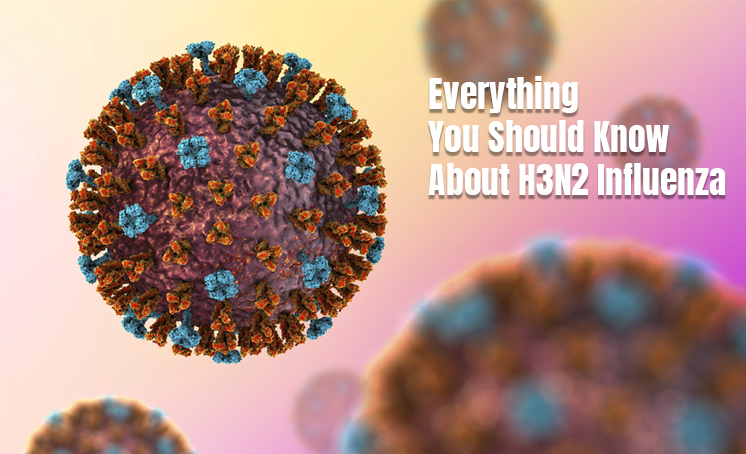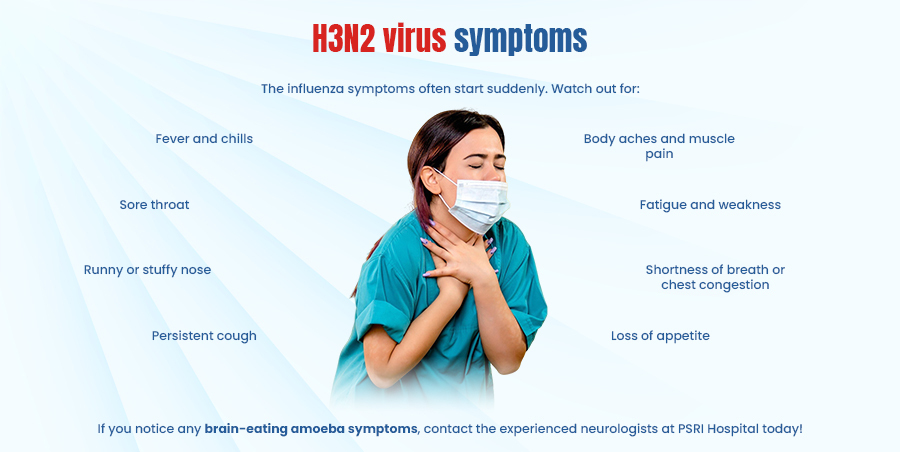H3N2 Influenza: Here’s What You Should Know to Protect Yourself

Delhi and nearby cities have seen a sharp rise in H3N2 influenza cases this season. Many families are reporting fever, cough and weakness lasting for several days.
Doctors at PSRI Hospital, the best hospital in Delhi, confirm that the H3N2 virus is affecting both children and the elderly more severely. Their body strength and immunity make recovery slower.
If you have a fever, feel tired or can’t get rid of the flu this guide will help you understand the infection and how to stay safe under expert care.
What Is H3N2 Influenza?
The H3N2 influenza virus is one form of the influenza A (H3N2) strain. It spreads during the flu season in India especially when the weather changes.
This flu virus subtype attacks the throat and lungs, often causing higher fever and longer recovery compared to a regular cold.
Recent WHO influenza alerts show that H3N2 infection has been one of the main reasons for hospital visits this year. The H3N2 flu virus infection keeps changing slightly every year through influenza virus mutation which is why taking the yearly flu vaccine 2025 or seasonal influenza vaccination is important.
How Does H3N2 Spread?
The H3N2 flu virus infection spreads through tiny droplets that move in the air when a sick person coughs, sneezes or even talks. You can catch this virus by:
- Touching surfaces where these droplets have settled and then touching your face.
- Breathing near someone who is sick can also spread the virus.
The virus usually takes one to four days to cause illness but an infected person can spread it even before feeling sick. Being in crowded places like markets, buses or offices makes it easier for the flu to pass from one person to another.
Who Is Most at Risk of H3N2 Influenza?
While anyone can get infected, some people are at higher danger:
- Elderly people due to weaker immunity and other illnesses.
- Children because their immune system is still developing.
- Pregnant women due to hormonal changes that affect defence.
- People with chronic disease like heart, kidney or diabetes patients.
- Asthmatic patients as breathing becomes more difficult.
- People with weak immunity systems.
For these high-risk flu groups, the infection can cause viral pneumonia, bronchitis infection or secondary bacterial infection. In such cases hospitalization due to flu may be required. Getting timely care from the best pulmonologist in Delhi NCR at PSRI Hospital prevents these H3N2 complications.
How to Prevent H3N2 Influenza?
You can protect yourself with simple daily habits:
- Take the flu vaccine 2025 that covers influenza A (H3N2).
- Practice a strict handwash routine and preventive hygiene at home and work.
- Wear a mask in closed or crowded places.
- Avoid crowded places during peak flu season in India.
- Maintain respiratory hygiene by covering your mouth and nose while coughing.
- Boost immunity naturally with fruits, vegetables and vitamin C for flu.
- Water intake should be enough and rest too.
- It is better not to resort to self-medication or the use of leftover antibiotics.

These steps help limit flu spread prevention at home and workplaces. Doctors at PSRI Hospital strongly advise annual vaccination and healthy habits to stay protected.
How Is H3N2 Infection Diagnosed?
If H3N2 virus symptoms worsen or you feel unwell for more than a few days, doctors suggest specific tests to confirm the infection. These include:
- Rapid flu test to detect flu quickly.
- RT-PCR test for influenza for accurate identification.
- Throat swab test or nasal swab testing.
- Influenza A/B testing to check the specific type.
- Differential diagnosis to rule out other infections.
- Confirmatory test for H3N2 in severe cases.
These help detect the virus early and guide treatment. PSRI’s NABL-certified labs provide same-day results so that treatment can start without delay.
H3N2 Virus Treatment Options
H3N2 virus treatment at the best hospital in Delhi includes:
- Antiviral medicines such as oseltamivir (Tamiflu) or zanamivir inhalation. Works best within the first 2 days.
- Supportive treatment like light meals, fluids, rest and fever management.
- Simple home remedies for flu such as steam inhalation for cold, saltwater gargle and herbal teas with ginger and turmeric benefits.
- A balanced immune booster diet like fruits, soups and proteins and good sleep.
- Self-isolation for flu to avoid infecting others.
Most people get better in about a week. The recovery time for H3N2 can be longer for older adults.
When to See a Doctor?
You should not delay medical care if you have:
- High fever that lasts more than three days.
- Breathing difficulty or chest pain.
- Very low energy or confusion.
- Unable to eat or drink enough fluids.
- Oxygen level falling below 94%.
These signs mean the flu may have become more serious.
In such situations, we offer ICU care for influenza, emergency monitoring and specialist support. Seeing the best pulmonologist in Delhi NCR early helps prevent severe flu symptoms and speeds recovery.
Consult Today at PSRI Hospital
If you or a family member has a flu-like illness, reach out to PSRI Hospital today. Our Pulmonology Department is led by the best pulmonologist in Delhi NCR with decades of experience in respiratory infections. They provide treatment through accurate testing and timely treatment. At PSRI, you get:
- Advanced testing and imaging
- 24×7 Emergency support
- Clean and safe care areas
- Guidance on flu prevention and vaccination
Call +91-8484848417 or book an appointment online to get expert advice before the infection worsens.
FAQ’s
- Is H3N2 influenza curable at home?
Ans. Mild cases improve with rest, fluids and antivirals prescribed by a doctor. However, seniors and children should be monitored by a specialist. - How long does the H3N2 virus stay contagious?
Ans. A person is contagious from one day before symptoms appear to about five days after falling sick. - Can I get H3N2 twice in a season?
Ans. It’s rare but possible if the virus mutates. Staying vaccinated reduces this risk. - Does the flu vaccine protect against H3N2?
Ans. Yes. The seasonal shot is updated yearly to cover major strains including influenza A (H3N2). - When should I rush to hospital?
Ans. If you face breathing trouble, high fever beyond three days or worsening fatigue, visit PSRI Hospital immediately.

 Book An Appointment
Book An Appointment Virtual Consultation
Virtual Consultation





